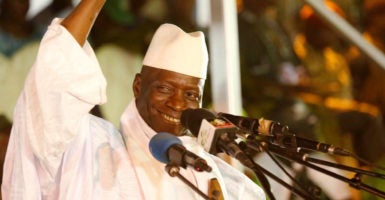The tiny West African country of The Gambia rarely makes international news, but a brewing conflict over presidential election results has thrust it into the spotlight.
In December 2016, Adama Barrow defeated The Gambia’s longtime dictator, Yahya Jammeh, in a presidential election. Jammeh once boasted he would rule for a billion years, so it was surprising when he conceded soon after the results were announced.
Jammeh reverted to form, however, when he reneged several days later, claiming the election results were fraudulent and calling for a new election. The international community widely condemned his backtracking, and regional countries under the Economic Community of West African States umbrella have been unsuccessfully pressuring Jammeh to step down ever since.
Jammeh’s intransigence has pushed his long-suffering country to the edge of crisis. His rule expired Wednesday at midnight. Barrow, who fled to neighboring Senegal on Sunday, was on Thursday sworn in as the new president at the Gambian embassy in the Senegalese capital of Dakar.
Foreign troops who entered The Gambia after the U.N. Security Council unanimously passed a measure supporting a regional military intervention have since halted. They are waiting for Jammeh to respond to a Friday noon deadline, which was then extended by several hours, to leave or face the consequences.
The Gambia has suffered under the unpredictable and brutal rule of Jammeh since 1994, when he seized power in a coup. His misrule has caused tens of thousands of Gambians to emigrate, and 60 percent of the country lives in poverty.
Per capita gross national income was $750 in 1993, the year before Jammeh took office. In 2014, it was $460. The long list of dubious international honors Jammeh claims to have won, and his boast that he can cure HIV/AIDS with an herbal concoction and prayer, have likely brought little comfort to his people either.
Barrow’s election was a moment of hope for the unfortunate country, a chance to move on from 22 years of vindictive rule. Jammeh’s refusal to respect the democratic process now imperils what should have been a fresh start for The Gambia.
The Gambia could also have joined a number of West African states bucking a recent trend in Africa away from democratic transitions and norms. In 2015, for the first time ever, a non-incumbent won the Nigerian presidency and peacefully took office.
Ghana recently completed presidential elections where the defeated incumbent stepped aside for the winner, Nana Akufo-Addo. Burkina Faso has had a tumultuous several years since Blaise Compaoré, the longtime strongman ruler, was forced out of office by mass protests in 2014, but stability has largely returned.
It is impossible to know exactly what will happen next. In the confused situation since the regional forces entered The Gambia, it is unclear which way its military is tilting. It is tiny and no match for the regional forces massed against Jammeh.
Many of its senior officers are loyal to Jammeh, however, as they hail from the same Jola tribe as he does. Military promotions are also frequently based on personal fealty to Jammeh, and he generally treated the security services well in a bid to win their allegiance.
Many Gambians want Jammeh gone, but he has loyalists who could cause trouble. Regional states are negotiating for him to leave into exile, but someone as erratic as Jammeh may be deluded enough to believe he can hold on to power, precipitating unnecessary violence.
There is still hope The Gambia can avoid a tumultuous transition from Jammeh, but one way or another, his rule is almost certain to end soon.
It is up to him now to decide whether he wishes, in a last act of abuse of his country, to cause further violence and instability, or to finally do the right thing for the Gambian people and leave without further protest.




























